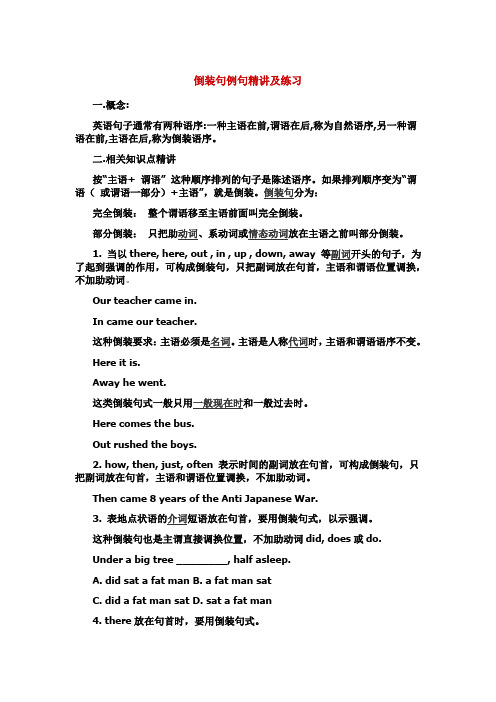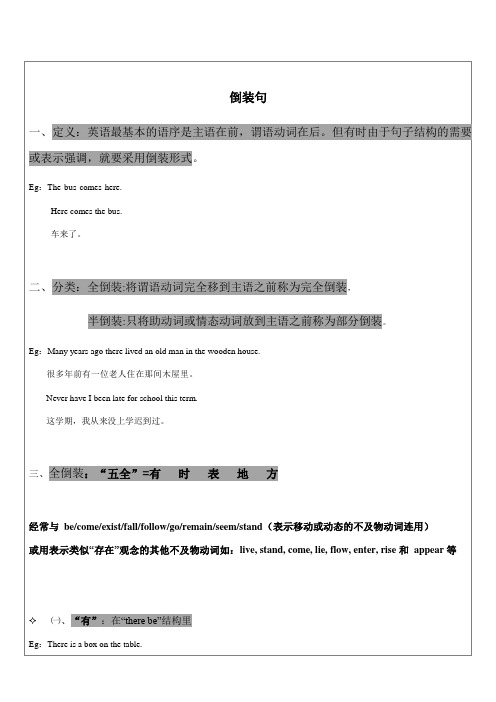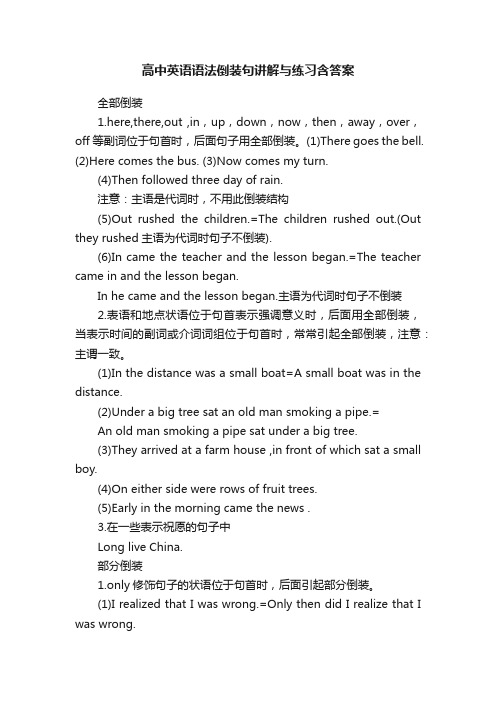倒装句讲与练
- 格式:doc
- 大小:73.50 KB
- 文档页数:5

倒装句例句精讲及练习一.概念:英语句子通常有两种语序:一种主语在前,谓语在后,称为自然语序,另一种谓语在前,主语在后,称为倒装语序。
二.相关知识点精讲按“主语+ 谓语” 这种顺序排列的句子是陈述语序。
如果排列顺序变为“谓语(或谓语一部分)+主语”,就是倒装。
倒装句分为:完全倒装:整个谓语移至主语前面叫完全倒装。
部分倒装:只把助动词、系动词或情态动词放在主语之前叫部分倒装。
1. 当以there, here, out , in , up , down, away 等副词开头的句子,为了起到强调的作用,可构成倒装句,只把副词放在句首,主语和谓语位置调换,不加助动词。
Our teacher came in.In came our teacher.这种倒装要求:主语必须是名词。
主语是人称代词时,主语和谓语语序不变。
Here it is.Away he went.这类倒装句式一般只用一般现在时和一般过去时。
Here comes the bus.Out rushed the boys.2. how, then, just, often 表示时间的副词放在句首,可构成倒装句,只把副词放在句首,主语和谓语位置调换,不加助动词。
Then came 8 years of the Anti Japanese War.3. 表地点状语的介词短语放在句首,要用倒装句式,以示强调。
这种倒装句也是主谓直接调换位置,不加助动词did, does或do.Under a big tree ________, half asleep.A. did sat a fat manB. a fat man satC. did a fat man satD. sat a fat man4. there放在句首时,要用倒装句式。
在“there + be”结构中的谓语动词有时不用be , 而用表示类似“存在”观念的其他不及物动词。
如:live, stand, come, lie, flow, enter, rise 和appear 等。

倒装句英语的基本句型是主语+ 谓语。
如果将主语与谓语调换, 称倒装句。
倒装句分全倒装句和半倒装句。
一、全倒装: 主语与谓语交换位置不需任何助动词, 叫全倒装。
全倒装有以下三种情况:1、当here, there, out, in, up, down,off,away等副词放在句首时, 句子需全倒装:There goes the bell! 铃响了!There lived an old man.Here comes the bus.¥注意①在这种情况下倒装仅限于不及物动词或be动词, 像go, come, rush等。
②主语如果是代词时不需倒装如Away he went. 他走远了。
2、方位状语在句首, 如:In front of the house stopped a police car.Under the tree sat a boy.二、半倒装: 主语与谓语的助动词交换位置称半倒装, 有以下数种情况:1、否定意义的词在句首, 句子半倒装, 例如: little, never, not, no, hardly, rarely, seldom,by no means(绝不),in noway(决不)Never shall I forget you./Little did I understand what he said to me at that time.2、几对并列连词如not only…but also, hardly…when等连接两个并列句, 连词在句首, 前句半倒装, 后句不倒装:Not only was everything he had taker away from him, but also his German citizenship was taken away.No sooner had I got to the bus stop than the bus started.注意: ①not only…but also连接两个并列主语时不需倒装, 如: Not only you but also I like playing chess.②neither…nor在句首时, 前后两句都需倒装,Neither do I have a sister nor does my husband.3、only在句首强调状语, 主句半倒装:?Only then did I realize that I was wrong.Only in this way can I learn from my fault.Only when the war was over in 1918, was he able to get back to work.注意: only强调主语不倒装:Only the teachers can use the room.4、so…that句型, so在句首时, 主句倒装, that从句不倒装:So easy is it that a clild can learn it.So hard did he work that he finally won the fame./I saw the film, so did he.1、倒装句(Inversion)英语的基本语序是“主语+谓语”。

桌子上面有一个盒子。
✧㈡、“时”:表示时间副词,如:now,then,
Eg:Now comes your turn.
现在轮到你了。
✧㈢、“表”:表语放句子前,“表语+系动词+主语” 的结构
Eg:Present at the party were Mr. Green and many other guests.
格林先生和其他的客人在这个聚会上。
Seated on the ground are a group of young men.
一群年轻人坐在了地上。
✧㈣、“地”:地点状语放在句首
Eg:In south of the river lies a small factory.
小工厂位于河的南方。
From the valley came a cry.
山谷传来一阵哭声。
✧㈤、“方”:表方位的副词here, there 或out, in, up, down, away, off 等标志词放在句首 Eg:There lies a large wheat field in front of the house.
房子前面有一大片麦田。
Off all the lights went when I came in.
当我进来时,所有的灯都灭了。
四、半倒装:“八部”=不只让步也常需(虚)如此祝福✧㈠、“不”表示否定。

高中英语语法倒装句讲解与练习含答案全部倒装1.here,there,out ,in,up,down,now,then,away,over,off等副词位于句首时,后面句子用全部倒装。
(1)There goes the bell.(2)Here comes the bus. (3)Now comes my turn.(4)Then followed three day of rain.注意:主语是代词时,不用此倒装结构(5)Out rushed the children.=The children rushed out.(Out they rushed主语为代词时句子不倒装).(6)In came the teacher and the lesson began.=The teacher came in and the lesson began.In he came and the lesson began.主语为代词时句子不倒装2.表语和地点状语位于句首表示强调意义时,后面用全部倒装,当表示时间的副词或介词词组位于句首时,常常引起全部倒装,注意:主谓一致。
(1)In the distance was a small boat=A small boat was in the distance.(2)Under a big tree sat an old man smoking a pipe.=An old man smoking a pipe sat under a big tree.(3)They arrived at a farm house ,in front of which sat a small boy.(4)On either side were rows of fruit trees.(5)Early in the morning came the news .3.在一些表示祝愿的句子中Long live China.部分倒装1.only修饰句子的状语位于句首时,后面引起部分倒装。

倒装句的用法英语倒装句分为两种:1、整个谓语在前的句子,叫完全倒装。
Here comes the car.2、部分谓语(情态动词、助动词、连系动词)在前,谓语的主体部分仍在主语之后的句子,叫部分倒装句。
Only then did he realize that he was wrong.必须弄清的两点:①若有主从句,哪句倒装。
②部分倒装还是完全倒装。
一、表示方位和时间的副词位于句首时(now ,then here ,there,out ,in ,up,down ,away ,back,off,on ), 句子全部倒装。
注:主语是代词时,不倒装。
(如 5,6)1.Here comes the bus .2.There goes the bell .3.Away went the students .4.Now comes the chance .Out rushed the children. he rushed.There comes the bus. 注意: 1.不能用进行时;he comes.2. 主语为人称代词时不倒装。
二、以介词短语表示的状语,提前位于句首时,全部倒装。
1.In a lecture hall of a university in England sits a professor .2.In front of our school stands a tower .3.By either side of the river grow a lot of apple trees .4.At the top of the mountain stands a temple .5. Among the goods are Christmas trees,flowers and toys.三、表语位于句首时,倒装结构为“表语+连系动词 +主语”A:形容词 +连系动词 +主语例 1.Present at the meeting were Professor White,Professor Smith and many other guests. 例 2.过去分词 +连系动词 +主语Gone are the days when they could do what they liked to the Chinese people.四、将 so\neither \nor 放在开头 ,表示“ 也 (不 )”的意思时 ,部分倒装注: 表示“确实是这样”时 ,不倒装1.He went to the film last night.So did I .2.You must finish your work ,so must I .3.She is interested in the story ,so am I .4.He didn ’ t turn up .Neither did his brother .5.His mother told him not to go to the film .So he did.五、在 if 条件 :在 if 条件句中 ,通常可以省略条件句 ,必须含有系动词if , 而将从句倒装were,助动词had 和情态动词should1.Were he younger(=If he were younger ),he would learn skating .2.Should they forget (=If they should forget ) to bring a map with them ,they would get lost inthe woods .3.Had they realized (=If they had realized ) how important the task was ,they wouldn ’ t have refused to accept .4.Were I you ,I would help her .六、否定词或半否定词(never .little ,seldom ,not ,nowhere ,scarely ,few ,by no means ,at no time ) 位于句首 ,应部分倒装1.Never have I been there .2.Little did I know about it .3.Seldom did she come late to school .4.Not a single mistake did he make .5.By no means should you buy that kind of car .七、以 not until,no sooner than , hardly when ,not only but also 所引导的状语放在句首时 ,需要部分倒装1.Not until 10 ’clock will the library open .2.No sooner had I gone out than he came to see me .3.Hardly had the train arrived when I ran to meet my friend.4.Not only does she speak English but also she follows the British way of life .八、 only及其修饰的状语位于句首时,后面的句子部分倒装。

倒装句1.部分倒装部分倒装是指把谓语的一部分(助动词、系动词或情态动词)置于主语之前(一般疑问句语序)。
这类句型主要有以下几种形式:(1)当否定词或带有否定意义的词或短语位于句首时,常用部分倒装。
这类词或短语有:little, few, never, seldom, rarely, by no means, not only, not until, at no time, under/in no circumstances, in no case, in no way, no sooner, hardly, scarcely等。
(2)当only修饰的副词、介词短语或状语从句位于句首时,用部分倒装。
Only when you can find peace in your heart will you keep good relationships with others.只有当你找到内心的平静时你才能与他人保持良好的关系。
(3)so/neither/nor置于句首时,用部分倒装。
①“so+be/助动词/情态动词+主语” 表示前面所说的肯定情况也适合于另一人或物,意为“……也是如此” 。
—I’ve got an enormous amount of work to do.——我有大量的作业要做。
—So have I.——我也如此。
②“neither/nor+be/助动词/情态动词+主语” 表示前面否定的内容也适用于另一人或物,意为“……也不这样” 。
My friend wasn’t happy,neither was I.(4)在so/such... that... 结构中,当“so+形容词/副词” 或“such+名词” 位于句首时,用部分倒装。
So suddenly did he catch the disease that the whole family were at a great loss. 他突然患病,全家人全然不知所措。
教学课题倒装句教学目标掌握完全倒装和部分倒装的结构教学重点倒转句的句型特点与难点教学过程一、概念及分类(一)概念英语的基本语序是“主语+谓语”,如果将谓语的一部分或全部放在主语之前,这种语序叫倒装。
倒装既是一种语法手段,也是一种修辞手段,用于表示一定的句子结构或强调某一句子成分。
(二)种类1. 完全倒装:将谓语的全部放在主语之前,通常只用于一般现在时和一般过去时例:Here is the book you want. 你要的书在这儿。
Down went the small boat. 小船沉下去了。
2. 部分倒装:将谓语的一部分,如助动词、或情态动词,移至主语之前。
例: Never have I seen her before. 我以前没见过她。
Only by working hard can one succeed. 只有努力才能成功。
【注意】若句中的谓语没助动词或情态动词,则添加助动词do, does或did,并置于主语之前例:Well do I remember the day I joined the League.入团的那一天,我记忆犹新。
Little did I think that he could be back alive. 我没有想到他竟能活着回来。
二、倒装句结构(一)完全倒装句结构1. There be结构(在此结构中可以用exist, seem, happen, appear, live, rise, stand等来代替be动词)例:There is a mobile phone and some books on the desk. 桌上有一个手机和一些书。
There lived an old fisherman in the village. 村里住着一位老渔夫。
There stand two white houses by the river. 河滨矗立着两座白房子。
英语倒装句讲解及练习八年级语法知识一.教学内容:倒装句基本模式:谓语动词(或一部分)+主语+其它成分概念:英语句子的自然语序是“主语+谓语”。
但由于语法结构的要求或修辞效果的需要,还可采用倒装语序。
倒装分为两种:完全倒装和不完全倒装。
完全倒装是指将谓语全部放在主语之前。
例如:Here comes the bus.车来了。
不完全倒装是指将谓语的一部分放在主语之前(谓语为一个行为动词时恢复原形,并加do/does或did置于主语之前),例:Never have I studied grammar.我从来没有学过语法。
Never do I study grammar.我从不研究语法。
规则:1、完全倒装句:一般用于一般过去时或一般现在时的语句中。
例:Out rushed the boy.(一般语序为:The boy rushed out.) Here is the book you want。
(一般语序为:The book you want is here.)Such was what he told me。
(一般语序为:What he told me is such.)注意:但主语若是人称代词时,谓语部分不倒装。
例:Here XXX(主语是第三人称代词he)2、局部倒装So和neither (nor)引起倒装结构,表示“A这样,B也这样”和“A不(是)这样,B也不(是)这样”。
如果主语为肯定,用so引导倒装结构;如果主句为否定,用neither(nor)引导倒装结构;倒装部分的谓语视主句的谓语而定,但人称的变化需与倒装部分的主语一致。
例:XXX。
so does he.她放声大哭,他也一样大哭起来。
分析:主句是肯定句,倒装用so引导;burst为实义动词,并且是一般现在时,因此倒装部分用do。
又由于倒装部分的主语是单数第三人称,所以do的人称也应变为第三人称单数形式does。
例:He doesn’t agree with you。
Grammar of the Inversion (Module 5 Unit 4)倒装句英语最基本的语序是主语在前, 谓语动词在后。
但有时由于句子结构的需要或表示强调, 就要采用倒装形式。
倒装分两种情况: 1)将谓语动词完全移到主语之前称为完全倒装, 2)只将助动词或情态动词放到主语之前称为部分倒装。
并且强调性倒装和以so, neither, nor开头的句子是高考例题的热点。
一、倒装句的意义1.用倒装构成疑问句,适应一定的语法结构的需要。
.in?Was the People's Liberation Army founded in 1927?2.为了强调某一部分, 而把这部分放到句首, 构成倒装。
t.fo.schoo.thi.term.So early did he come to school that no other students came.二、倒装的用法完全倒装1.在“ther.be”结构里, there是引导词, 主语在be后。
在“there + be”结构中的谓语动词有时不用be , 而用表示类似“存在”观念的其他不及物动词。
如: live, stand, come, lie, flow, enter, rise 和appear等。
e.g.Ther.i..bo.o.th.table.There came shouts for help from the river.There lies a large wheat field in front of the house.Many years ago there lived an old man in the wooden house.2.为了表达生动, 有时把表地点、方位的副词, 如here, there, now , then,, thus ,up, down, out, off, over, away, in等放在句首, 同时把谓语动词放在主语之前, 在here, there等副词开头的某些句子里(要用一般现在时态)。
英语语法专题倒装讲义和练习及答案英语的大体语序是“主语+谓语”,若是将谓语的一部份或全数放在主语之前,这种语序叫倒装。
倒装既是一种语法手腕,也是一种修辞手腕,用于表示必然的句子结构或强调某一句子成份。
倒转句的考查主要从以下几个方面入手:1)含有否定意味的词置于句首,部份倒装;2)only+状语/状语从句置于句首,部份倒装;3)so/such…that句型中,so+形容词/副词提前,部份倒装;4)表示方位的副词或介词短语放在句首,要完全倒装。
一.倒装的原因A.语法倒装由于语法结构的需要,将谓语的全数或一部份移到主语之前。
1.一般疑问句当咱们把一个肯定句转变成疑问句时,常把肯定句中的助动词或情态动词放在句首。
这种助动词或情态动词包括:be,have,can,do,shall,will,may,must,dare,need,ought或used 等。
He will do it. ——Will he do it?他会做这件事吗?This is my mobile phone number. ——Is this your mobile phone number?这是你的电话号码吗?提示:若是肯定句中没有助动词或情态动词时,咱们可以在句首用do 的某种形式,以组成倒装语序。
Jack likes to eat fish. 杰克喜欢吃鱼。
——Does Jack like to eat fish 杰克喜欢吃鱼吗?2.特殊疑问句特殊疑问句的组成:特殊疑问词+ 一般疑问句What does he like to eat 他喜欢吃什么?When will they go to the Great Wall 他们何时去长城?Where did you go last night 昨晚你去哪里了?Who is not coming to dinner tonight 今晚谁不来用饭?3. 反意问句在反意问句中,用一般疑问句的形式,前后两分句的主语,人称要一致。
一、方向性副词置于句首,完全倒装1..以there, here, now, then引导的,引起人们注意的招呼句,要全部倒装。
There goes the bell.铃响了。
Here comes the bus.车来了。
Now comes your turn.轮到你了。
Then came another disaster.Here is a letter for you.Off went the horse.马跑了。
In came the teacher.老师进来了。
Away fled the thief.Up into the sky flew the arrow.Down into the water fell the meat.2010全国阅读Along the river banks of the Amazon there lives a bird called the hoatzin that swims before it can fly, and has claws (爪) on its wings when young.2. 表地点的词语置于句首或强调地点概念时全部倒装。
On the table were some flowers.桌子上有一些花。
Between the two buildings stands a tall tree. 在两幢楼之间有一棵大树。
In the dark forests lie many lakes, some large enough to hold several Englishtowns.在黑暗的森林里有许多湖泊,其中有一些有几个英国城镇那么大。
Among all these presents is included a very nice watch, which was given by my teacher John.★当句子的主语有人称代词担当时,句子不倒装,如:Here it is/Here you are.Away they went.Here he coms.★时态Look, the bus is coming! = Look, here comes the bus!2010江苏33.--- Is everyone here?--- Not yet……Look , there_______ the rest of our guests!A. comeB. comesC. is comingD. are coming二、否定词置于句首,部分倒装。
否定词never, seldom, hardly, scarcely, barely, rarely, little, not, nowhere, by no means, at no time, neither, nor等放在句首时,句子常用部分倒装Little did he know he was seriously ill.Li works hard. Wang works harder. Ma hardly works.=Hardly does Ma work.Nowhere could I find him.By no means shall we give up.无论如何我们都不会放弃。
Neither will theory do without practice, nor will practice do without theory.理论离不开实践,实践也离不开理论。
Never in my wildest dreams could I imagine these people are living in such poor conditions. 就算在最荒诞的梦里,我也绝不会想到这些人竟然生活得这么贫困。
I’ve trie d very hard to improve my English, but by no means is the teacher satisfied with my progress.我一直非常努力地去提高我的英语水平,但是老师根本不满意我的进步。
If you don’t support the plan, neither will I. (注意时态)在not only...but also..., no sooner...than..., hardly...when..., scarcely...when..., not until...句中,主句用部分倒装,从句不倒装,但要注意:neither...nor...连接句子的主语时前后两个分句都倒装。
Hardly/Scarcely had he heard the news when he began to cry.他一听到这个消息就哭了。
He had no sooner come home than she started complaining.= No sooner had he come home than she started complaining.We had hardly begun when/before we were told to stop.= Hardly had we begun before we were told to stop.Neither is she a doctor, nor is she a nurse.★He didn’t leave until I returned.= Not until I returned did he leave.三、only+状语(副词、介词短语、状语从句)放在句首时,要部分倒装。
Only in this way can you work out the problem.只有用这种方法你才能解决问题。
Only when the war was over was he able to go back to his own country.战争结束了,他才得以回家。
Only if you eat the correct foods will you be able to keep fit and stay healthy.只有你吃对食物,你才能保持健康。
Only by keeping down costs will Power Data has its advantage over other companies.只有降低成本,Power Data公司才能比其他公司有优势。
Only in this way can the honor of the country be saved.★ only + 主语Only John saw the lion.Only she remembered that it was my birthday.Only Gerhadt seemed a little doubtful.四、其它几种情况1、as / though 引导的让步状语从句Hero as he is, he still has shortcomings. 尽管他是一个英雄,但是他也有缺点。
Much as I like it, I’ll not buy it.尽管我很喜欢它,但我不会买。
Pretty as she is, she is not proud. 尽管她很漂亮,但她一点也不自负。
Try as he would, he might fail again. 尽管他还会试,但可能还会失败。
2. So...that..., Such...that… , such,so 置于句首Such great progress did he make that he was praised.他取得了如此大的进步以致于受到了表扬So sudden was the attack that the enemy had no time to escape.3. 表语前置Attending the ceremony were the guests from abroad.Lined along the road are green grass, red flowers and pine trees.4. 虚拟语气条件句,省去if, 注意:有时出现在句尾。
Had I taken your advice, I would not be in trouble now.We would put off the match should it rain tomorrow.5. however放在句首时,形容词或副词跟在however后用倒装句式。
However difficult it is, I’ll work it out on time.不管它有多难,我都会按时完成。
However easy the job is, you can’t be too careful with it.However faraway the town is, I’ll walk there.6. May开头表示祝愿的句子May God bless you.May you have a good time.May some of the suggestions prove of value to you as well.May your flowers increase.配套练习1. If Joe’s wife won’t go to the party, .A. he will eitherB. neither will heC. he neither willD. either he will2. At the foot of the mountain .A. a village liesB. lies a villageC. does a village lieD. lying a village3. I have been living in the United States for twenty years, but seldom so lonely as now.A. have I feltB.I had feltC.I have feltD. had I felt4. Only when the fire was under control to return to their homes.A. the residents would be permittedB. had the residents been permittedC. would the residents be permittedD. the residents had been permitted5. Hearing the dog barking fiercely, away .A. fleeing the thiefB. was fleeing the thiefC. the thief was fleeingD. fled the thief6. Distinguished guests and friends, welcome to our school. the ceremony of the 50th Anniversary this morning are our alumina(校友)from home and abroad.A. attendB. to attendC. attendingD. having attended7. So sudden that the enemy had no time to escape.A. did the attackB. the attack didC. was the attack D .the attack was8. The computer was used in teaching. As a result, not only , but students became more interested in the lessons.A. saved was teachers’ energyB. was teachers’ energy savedC. teachers’ energy was savedD. was saved teachers’ energy9. Little about her own safety, though she was in great danger herself.A. did Rose careB. Rose did careC. Rose does careD. does Rose care10. It was ________ he came back from Africa that year he met the girl he would like to marry.A. when; thenB. not; untilC. not until; thatD. only; when11. Not until I came home last night to bed.A. Mum did goB. did Mum goC. went MumD. Mum went12. For a moment nothing happened. Then all shouting together.A. voices had comeB. came voicesC. voices would comeD. did voices come13. Unsatisfied with the payment, he took the job just to get some work experience.A. though was heB. though he wasC. he was thoughD. was he though14. So hard that he can go to an ideal university.A. studied TomB. did Tom studyC. does Tom studyD. studies Tom15. Not a single word when he left home and joined the army in 1941.A. did he leaveB. left heC. did leave heD. he left16. Many people agree that never in history a more splendid opening ceremony than that of the Beijing Olympics.A. there wereB. has there beenC. there has beenD. were there17._______ entered the office when he realized that he had forgotten his report.A. He hardly hadB. Had he hardlyC. Hardly had heD. Hardly he had18. Our English teacher told us that not only to us but also the English was good for us to learn.A. is the story interestingB. was the story interestingC. the story is interestingD. the story was interested19. Among the high risk group of heart disease people with a preference for fat rich foods.A. there areB. areC. they areD. who are20. __________, the 12-year-old girl Li Yue, a victim in the Wenchuan Earthquake practises dancing hard to make her dream come true.A. Instead of being disabledB. For being disabledC. Disabled as she isD. In case of being disabled21. Hardly to speak when there was a shout from the back of the hall.A. has she begunB. she has begunC. had she begunD. she had begun22. Off without so much as a “goodbye”.A. went JennyB. did Jenny goC. goes JennyD. does Jenny go23. At the sight of the policeman, from behind the door.A. did the boy rush outB. did he sit downC. out rushed the boyD. rushing out was the boy24. ________ it rain tomorrow, we would have to the picnic.A. Would; put forwardB. Should; call offC. Were; put offD. Should; put up25. Peter has been busy these days and seldom to come over to have a chat with me.A. doesn’t he have timeB. does he have timeC. he has timeD. he hasn’t time26. ____ _ about wild plants that they decided to make a trip to Madagascar for further research.A. So curious the couple wasB. So curious were the coupleC. How curious the couple wereD. The couple was such curious27. _______ from the third floor the policeman pointed his gun at him.A. Jumped down the thief; untilB. Down the thief jumped; whenC. The thief jumped down; untilD. Down jumped the thief; when28. In no country Britain, as has been mentioned, experience four seasons during the course of a single day.A. other than; one canB. apart from; one canC. other than; can oneD. rather than; can one29. Out there, in the midst of the snow, in long, black clothes.A. a woman satB. sat a womanC. was sitting a womanD. a woman was sitting30. Life is harder for Senior Three students throughout China, hardly endless exercises or tests.A. does everyday go by withB. does any day go by withoutC. everyday goes by withoutD. any day goes by with。